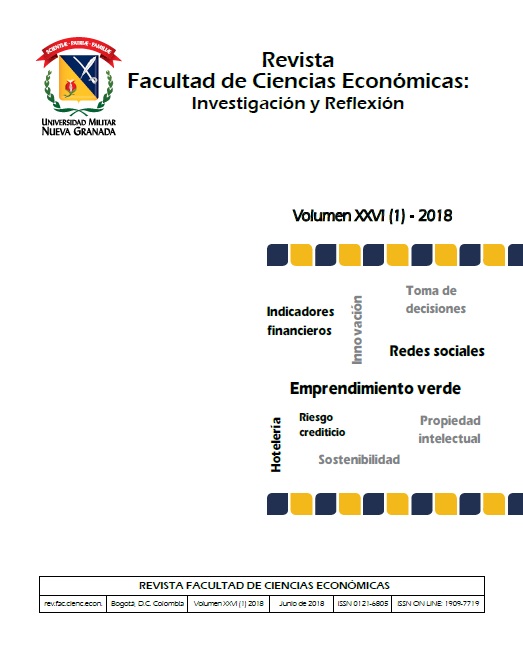Green entrepreneurship around the conservation and recovery of water and its spaces in Bogotá and Medellin (Colombia)
Abstract
Green entrepreneurship is understood in this document, as the development of activities aimed at mitigating, reducing or eliminating environmental problems, which are considered as innovative, insofar as they propose changes in production and consumption patterns that deteriorate the natural conditions of the planet and in the relationship of the human being with the environment. In this case, the object of analysis is the green enterprise oriented to the restoration and conservation of water and its spaces in Bogotá and Medellín. The research developed was based on the application of semi-structured interviews to actors of different types, involved in these activities. It was considered that water spaces are common goods, around which prevails the general feeling that they belong to all and at the same time to nobody. It is concluded that an effective model to achieve its proper management implies participatory co-management, which opens the possibility to green entrepreneurship promulgated by different actors. In this sense, there were found ventures promoted by actors of the public sector, private companies, non-profit organizations, social organizations, water funds, among other actors; some of which intervene directly on the water spaces and others indirectly, through the optimization of consumption. The intervention in the water spaces in Bogotá and Medellin has generated positive impacts, however, the efforts are still very incipient and of local scope, taking into account the extension of the water spaces in the territory.Downloads
References
Allen, J. & Malin, S. (2008). Green entrepreneurship: a method for managing natural resources? Society and Natural Resources: An International Journal 21, (9).: 828-844 https://doi.org/10.1080/08941920701612917
Canelón, J. (2008). Los bienes comunes: sentidos producidos sobre el agua del Valle de Quibor, Venezuela. Espacio Abierto Cuaderno Venezolano de Sociología, 17 (1): 109–142 ISSN 1315-0006 / Depósito legal pp 199202ZU44
Cloquell, M. (2012). Nuevo análisis "La tragedia de los comunes". Teoría y praxis. (11): 40–58.
Cohen, B. & Winn, M.I. (2007). Market imperfections, opportunity and Sustainable Entrepreneurship. Journal of Business Venturing 22(1), 29-49. https://doi.org/10.1016/j.jbusvent.2004.12.001
Consejo de Estado (2014). Sentencia del 28 de marzo. Expediente A.P. 90479. Cuenca Hidrográfica del Río Bogotá.
Dean, T.J. & McMullen, J.S. (2007). Toward a theory of sustainable entrepreneurship: Reducing environmental degradation through entrepreneurial action. Journal of Business Venturing, 22: 50–76. https://doi.org/10.1016/j.jbusvent.2005.09.003
Delclòs i Ayats, J. (2008). La gestión pública del agua con participación y control social. Hacia el derecho humano del agua. Viento sur, (98): 84-90
Delgadillo, J. & Alburquerque, F. (2010). Emprendimientos de base ecológica, un modelo de interacción económica y te¬rritorial en Áreas Naturales y Protegidas de Espa-a y México. 1ª ed., Instituto de Investigaciones Económicas-unam, Universidad de Sevilla, Colegio de Tlaxcala, México. 123 p.
Feeny, D. Berkes, F. McCay, B. & Acheson, J. (1990). La tragedia de los comunes: 22 a-os más tarde. El jarocho verde. Human E Ecology, 18 (1). Traducción: Hipólito Rodríguez y Enrique Portilla Ochoa.
Gibbs, D. (2009). Sustainability Entrepreneurs, Ecopreneurs and the Development of a Sustainable Economy. Greener Management International Issue (55): 63-78. issn 0966-9671
González, C. (2014). Espacios del agua en el territorio urbanizado. Los Ángeles, California. Revista europea de investigación en arquitectura. REIA (2): 63-78. ISSN: 2340–9851
Gunawan, A. (2014). Preliminary Study of Classifying Indonesian Entrepreneurs. Procedia - Social and Behavioral Sciences 115: 243–250. https://doi.org/10.1016/j.sbspro.2014.02.432
Gutiérrez, A. (2011). El grito de los bienes comunes: ¿qué son? Y ¿qué nos aportan? Rev. Ciencias Sociales 131-132: 127-145 / 2011 (I-II). ISSN: 0482-5276.
Hamdouch, A. & Depret M-H. (2012). Green entrepreneurship networks and clusters: when the local requires the global. RSA global conference Junio. Beijing, China.
Hardin, G. (1968). The Tragedy of the Commons. New Series, 162 (3859): 1243-1248.
Indij, D. & Hantke, M. (2013). Mapeo sobre integridad del agua en América Latina. Informe realizado en colaboración con Cap-Net y el Programa de Gobernabilidad del Agua del PNUD en SIWI.
IPCC (2014). Cambio climático 2014. Informe de síntesis. Contribución de los grupos de trabajo I, II y III al Quinto Informe de Evaluación el Grupo Intergubernamental de Expertos sobre Cambio Climático. Ginebra, Suiza, 157 págs.
Iyigun, N. (2015). What could Entrepreneurship do for Sustainable Development? A Corporate Social Responsibility-Based Approach. World Conference on Technology, Innovation and Entrepreneurship. Procedia - Social and Behavioral Sciences 195: 1226–1231. https://doi.org/10.1016/j.sbspro.2015.06.253
Izaidin, A.M. & Koe, W.L. (2012). Sustainable Entrepreneurship (SE): A Revised Model Based on Triple Bottom Line (TBL). International Journal of Academic Research in Business and Social Sciences, 2 (6): 293-310
Kuckertz, A. & Wagner, M. (2010). The influence of sustainability orientation on entrepreneurial intentions - Investigating the role of business experience. Journal of Business Venturing 25: 524–539. https://doi.org/10.1016/j.jbusvent.2009.09.001
López, J. (2012). Modelos actitudinales y emprendimiento sostenible. Cuides. Cuaderno Interdisciplinar de Desarrollo Sostenible, Universidad de Almeria, (8): 111-132
McEwen, T. (2013). Ecopreneurship as a solution to environmental problems: implications for college level entrepreneurship education. International Journal of Academic Research in Business and Social Sciences. 3 (5): 264-288.
Ministerio de Agricultura, Alimentación y Medio Ambiente (s.f.). Catálogo de gobernanza del agua en Espa-a. [citado 18 de julio de 2016]. Disponible en internet http://www.magrama.gob.es/es/agua/temas/sistema-espaniol-gestion-agua/
Ministerio de Ambiente, Vivienda y Desarrollo Territorial MAVDT. (2010). Política Nacional de Producción y Consumos Sostenibles. 72 p.
Mira, J. (2006). El agua un bien público. Gestión y Ambiente, Universidad Nacional de Colombia, Medellín, Colombia. 9(3):. 69-80.
Nacu, C. & Avasilcăi, S. (2014). Technological Ecopreneurship: conceptual approaches. Procedia - Social and Behavioral Sciences 124: 229–235. https://doi.org/10.1016/j.sbspro.2014.02.481
Organization for Economic Cooperation and Development. OECD (2011a). Entrepreneurship at a Glance 2011. [citado 06 de octubre de 2015]. Disponible en internet <http://dx.doi.org/10.1787/9789264097711-en>. 114 p.
Pacheco, D., Dean T. & Payne, D. (2010). Escaping the Green Prison: Entrepreneurship and the Creation of Opportunities for Sustainable Development. Journal of Business Venturing, 25: 464-480. https://doi.org/10.1016/j.jbusvent.2009.07.006
Ratti, M. & Chhibber, S. (2014). Green entrepreneurship: road to green economy-environment-sustainable social system. International Journal of Social Science & Interdisciplinary Research IJSSIR, 3 (11): 82-95, ISSN 2277-3630. Disponible en indianresearchjournals.com.
Sabogal, C. (2011). Generar ciudad: recuperación del sistema hídrico dentro de la estructura urbana de Bogotá. Traza (4): 68–89. ISSN 2216-0647
Sanabria, S. & Sabogal, J. (2011). Transferencia de tecnología en proyectos del mecanismo de desarrollo limpio (MDL) en Colombia. Sexto Encuentro de Investigaciones de la Universidad Militar Nueva Granada. Bogotá, 2011. 10 p
Silajdzic, I. Kurtagic, S. & Vucijak, B. (2015) Green entrepreneurship in transition economies: a case study of Bosnia and Herzegovina. Journal of Cleaner Production 88: 376-384. https://doi.org/10.1016/j.jclepro.2014.07.004
Stern, N. (2007). El informe Stern: La verdad sobre el cambio climático. Barcelona: Paidós.
Torres, L. (2014). Sistema Lerma: una visión política en la gestión pública del agua, ¿solución Estatal o Federal?. ISBN: 978-607-8087-16-7.
UNESCO (2006). El agua una responsabilidad compartida, 2° informe de las Naciones Unidas sobre el desarrollo de los recursos hídricos en el mundo. Capítulo 11. Compartir el agua. [citado 18 de julio de 2016]. Disponible en internet http://webworld.unesco.org/water/wwap/wwdr/wwdr2/pdf/wwdr2_ch_11_es.pdf
Uslu, D., Hancioglu, Y. & Demir, E. (2015). Applicability to Green Entrepreneurship in Turkey: A Situation Analysis. World Conference on Technology, Innovation and Entrepreneurship. Procedia - Social and Behavioral Sciences 195: 1238-1245. https://doi.org/10.1016/j.sbspro.2015.06.266
Valdovinos, J. (2011). De la gestión local a la gobernanza global. Actores e interacciones multi-niveles en la gestión del agua en la ciudad de México. Regions & Cohesión. Volume 1, Issue 3: 34-66.
Vazquez-Brust, D. Smith, A. & Sarkis, J. (2014). Managing the transition to critical green growth: The 'Green Growth State. Futures 64: 38-50. https://doi.org/10.1016/j.futures.2014.10.005
Zahedi, A. & Otterpohl, R. (2015). Towards Sustainable Development by Creation of Green Social Entrepreneur's Communities. 12th Global Conference on Sustainable Manufacturing. Procedia CIRP 26: 196-201.
Zegarra, E. (2014). Economía del agua. Conceptos y aplicaciones para una mejor gestión. Grupo de Análisis para el Desarrollo (GRADE). ISBN: 978-9972-615-79-5.
Zoninsein, L. (2014). Economía Verde. Lima: Soluciones Prácticas. 63 p. Biblioteca Nacional del Perú N° 2014-17811











